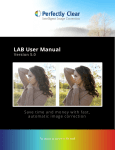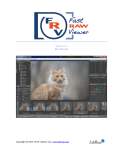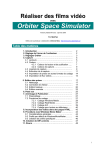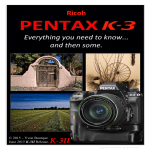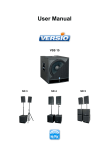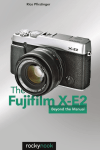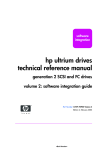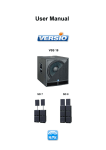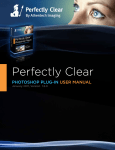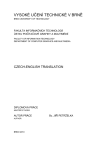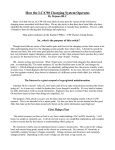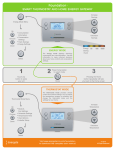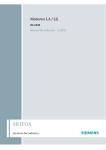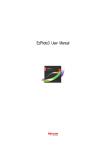Download Perfectly Clear LAB v4.0 User Manual
Transcript
Perfectly Clear LAB USER MANUAL May 2014, Version 4.2 (v4.2.0) Athentech Imaging Inc. World Headquarters: Suite 401, 2- 14 St. NW, Calgary, Alberta, Canada T2N 1Z4 Phone: 403.263.6022 E-mail: [email protected] Website: www.athentech.com © 2014 Athentech Imaging Inc. Athentech, Athentech Imaging, Perfectly Clear, The Real World… Perfectly Clear, Real Color Photography, are all registered trademarks of Athentech Imaging Inc. Page 1 Congratulations! You will soon be processing your photos through the World’s fastest and most advanced automatic image correction science available on this planet! Perfectly Clear is award winning technology with over 10 patented corrections and more than 10 years of scientific research, The benefit is Real Color Photography® – accurately beautiful corrections - ensuring that your memories are perfectly preserved. Our mission is to save you significant time while producing outstanding quality. Automatically. Why Perfectly Clear? Perfectly Clear is Intelligent Image Correction that makes your memories look the best they can be with minimal user interaction! We distinguish between Image Correction and Enhancement. At Perfectly Clear, we only do image correction. Unlike “enhancements”, we don’t change the context of your photo. Instead we correct for camera hardware limitations. We’re not creative or artistic effects. We’re necessary core corrections. Enhancements won`t rescue your photo. Perfectly Clear will. Page 2 Inside This Manual Chapter 1 System Requirements & Specs 4 Chapter 2 What’s New 7 Chapter 3 Speed Metrics 10 Chapter 4 Installation & Activation 13 Chapter 5 Let’s Start Processing 16 Chapter 6 Fine Tuning 23 Chapter 7 PDF Processing and tronPDF 35 Chapter 8 Channels, Triggers, Archives 38 Page 3 Chapter 1 System Requirements & Specs Page Page 4 4 Minimum System Requirements • Windows XP, Vista, Windows 7 or 8, Windows Server 2003 or later • .NET framework 4.0 or higher • 4 GB of RAM (8 GB or more is recommended) Our recommended hardware is an Intel i7 CPU or equivalent with 8 GB or more of RAM running Windows 7 or 8. Perfectly Clear LAB is multi-processor enabled and will automatically utilize all the cores on your machine for maximum efficiency. Input File Formats Perfectly Clear LAB processes JPG, PNG, TIF files and over 260 different RAW formats (listed on the following page. Input images must be in an RGB colorspace (no grayscale or CMYK, or indexed color). Unsupported files that are added to a Perfectly Clear LAB channel are passed through, un-altered. Perfectly Clear LAB (PDF) adds support for automatically extracting, correcting, and replacing supported images in PDF documents. Output File Formats Perfectly Clear LAB has an option to convert the output file to JPEG format, or to determine the file type automatically. Automatic output format will match the input file format, or will be JPG in the case of RAW files. Output images will be 8-bit per channel in color depth, regardless of input color depth. Page 5 RAW File Support Perfectly Clear LAB supports RAW files from the leading makers and models of DIgital SLR, mirrorless, and point & shoot cameras. RAW support is provided on a model-by-model bases, not my camera maker or file extension. The table below lists the RAW camera models that are supported in this version. Make Model Canon EOS: 10D, 20D, 30D, 40D, 50D, 60D, 1D, 1D Mark II, 1D Mark IIn, 1D Mark III, 1D Mark IV, 1Ds, 1Ds Mark II, 1Ds Mark III, 1D X, 5D, 5D Mark II, 5D Mark III, 6D, 7D, 100D, 300D, 350D, 400D, 450D, 500D, 550D, 600D, 650D, 700D, 1000D, 1100D, D30, D60, EOS M, Powershot: G1 X, G10, G11, G12, G2, G3, G5, G6, G9, S100, S40, S45, S50, S60, S70, S90, S95, Pro1, SX1 NIkon D4, D40, D40x, D50, D60, D70, D70s, D80, D90, D100, D200, D300, D300s, D600, D700, D800, D800e, D3s, D3x, D3, D2x, D2h, D2xs, D2hs, D1, D1h, D1x, D3000, D5000, D3100, D5100, D5200, D7000, D7100, 1 J1, 1 V1, 1, J2, 1 J3, 1 S1, 1 V2, P6000, P7000 Sony A33, A35, A37, A55, A55V, A57, A58, A65, A77, A99, A100, A200, A230, A290, A300, A330, A380, A390, A350, A450, A500, A550, A560, A580, A700, A850, A900, DSC-R1, NEX-3, NEX-3N, NEX-5, NEX-5N, NEX-5R, NEX-6, NEX-7, NEX-F3, NEX-C3, RX100 Olympus E-1, E-3, E-5, E-10, E-20, E-30, E-300, E-400, E-410, E-420, E-450, E-500, E-510, E-520, E-600, E-620, E-P1, E-P2, E-P3, E-PL1, E-PL1s, E-PL2, E-PL3, E-PL5, E-PM1, E-PM2, C5050z, C5060wz, C7070wz, C8080wz, OM-D E-M5, SP-310, SP-320, SP-350, SP-500uz, SP-510uz, SP-550uz, XZ-1 Panasonic FZ100, FZ150, FZ200, FZ18, FZ28, FZ30, FZ35, FZ38, FZ40, FZ45, FZ50, FZ8, G1, G2, G3, G5, G6, G10, GF1, GF2, GF5, GF6, GH1, GH2, GH3, GX1, L1, L10, LX1, LX2, LX3, LX5, LX7 Leica DIGILUX 3, V-LUX 1, V-LUX 2, V-LUX 3, D-LUX 2, D-LUX 3, D-LUX 4, D-LUX 5, M8, M9, X1, X2, Digital MODUL-R8, Digital MODUL-R9 Pentax K100D, K100D Super, K10D, K110D, K20D, K30, K200D, K2000, *ist D, *ist DL, *IST DL2, *ist DS, *ist DS2, K-01, K-5, K-5II, K-5IIs, K-7, K-m, K-r, K-x Minolta DiMAGE: 7, 7i, 7Hi, A1, A2, A200, MAXXUM: 5D, 7D, DYNAX: 5D, 7D, ALPHA-5 DIGITAL, ALPHA SWEET DIGITAL, Alpha-7 Digital Samsung GX-10, GX-20, GX-1L, GX-1S, NX10, NX11, NX100, NX200, NX5 Kodak DCS: Pro 14n, Pro 14nx, Pro SLR/c, Pro SLR/n Fuji X100 Page 6 Chapter 2 What’s New Page 7 What’s New and Exciting in v4– a lot of new features 1. Waaaay faster! Did we say significantly faster? You bet. Version 4 is up to four times faster than before! See the next page for performance metrics. 2. 64 bit support 3. Works on RAW files 4.Beautify! Beautify is revolutionary new technology designed to work automatically to provide your portrait shots with flawless skin tones, lively eyes, and sparking teeth. There are 4 specific algorithms at work: a. Perfectly Smooth b. Eye Enhance c. Eye Enlarge d. Teeth Whitening 5. Linked presets with Perfectly Clear Workbench Once you’ve created your custom preset in Perfectly Clear Workbench, it will automatically appear in LAB. Make an edit in LAB and it will be reflected in Workbench. These Presets are also linked with our Plug-ins. Your custom presets will now be preserved every time you update LAB in the future. This greatly simplifies the process of tuning your Perfectly Clear settings be visualizing the results in Workbench before building a Channel and processing images in LAB. 6. New look and feel The sleek new interface puts all the tools you need to run your Lab at your fingertips, while keeping the familiar channel table and layout intact. 7. Powerful workflow improvements a. Drag and drop images onto channels b. Option to have channels start automatically when LAB starts Page 8 Updates to Version 4 4.2 Major improvement to Perfectly Clear LAB’s color management facilities. Better detection of input color profiles for non-RAW files, and added the option to leave images in the input profile instead of converting to sRGB for all images. Added the option to use sRGB for all image files that do not include an embedded color profile. See page 40 for details. Many minor stability improvements when using red-eye and minor workflow and usability improvements. 4.1 Added support for tronPDF-enabled PDF files for reliable detection of the type of images embedded in PDF files. Fixed to rare image corruption issues and improved stability 4.0.X A 32-bit version of Perfectly Clear LAB was added. Performance of Noise removal was improved and an issue with full-page images in PDF files was resolved. Stability issues with Beautify and Redeye reduction were implemented. Page 9 Chapter 3 Speed Metrics Page 10 1. v4.0 is almost 4 times faster than our older versions • 3.8 times faster to be precise 2. Hourly processing volumes : 3,000 – 6,000 photos • Specifically: o Using a laptop with 16 GB RAM, i7 2.6 GHz Quad core (8 threads), flash drive, Windows8 64 bit: 6,031 images per hour o Using a computer with 8 GB RAM, i7 2.7 GHz dual core (4 threads), Windows8 64 bit: 3,120 images per hour 3. Processing Times Depending on the: i) size of the photo (in megapixels) ii) your computer specifications (RAM, CPU, cores) iii) preset used. The number is with the Vivid Details Preset • 0.06 and 0.12 seconds/megapixel respectively using the above 2 machines Speed Comparison Total time vs Image Size (Megapixels ) 3.00 Time (s) 2.50 2.00 8 GB RAM, i7 2 cores (4 threads) 1.50 16 GB RAM, i7 4 cores (8 threads), ?lash drive 1.00 0.50 -‐ 4 6 8 10 12 14 16 18 Page 11 20 22 24 3. Speed impact of varying presets The below chart shows how the different presets compare in time using Vivid Details as a benchmark. ie: FixDark is 31% slower, Traditional is 16% faster. Using the less powerful computer above, this equates to the following hourly volume: 4. Speed RAW V4.0 supports RAW processing. The time to process a RAW photo will be approximately 2 times slower compared to the equivalent jpeg. Page 12 Chapter 4 Installation & Activation Page 13 Installing Perfectly Clear LAB Simply double click on the “Perfectly Clear LAB Setup.exe” file and follow the on screen instructions. A short-cut will be installed on your desktop, and the actual files and folders will be installed on your computer at the following location: C:\Program Files\Athentech\Perfectly Clear LAB 4. Activating Perfectly Clear LAB When you first run Perfectly Clear LAB, it will be running in Trial Mode. To activate, click the “System” button in the top right, and select “License...” The following screen will appear: If you have already purchased and have a license key, press Activate, to reveal this window: Page 14 Enter your Activation Key in the top box. If you purchased a subscription from our web store, then enter the Subscription Refernence Number into the lower box. This will allow your subscription to auto-update at the end of each subscription period. (Entering the reference number is not required if you use the ‘Buy Now’ feature within the LAB application.) If you have not purchased yet, you can click “Buy Now” to go directly to the Athentech webstore. Once you purchase, your license will automatically be stored in the application and it will be activated and ready to use. If the server you intend to run Perfectly Clear LAB on is not connected to the internet, then click the Activate Offline to enter an unlock code provided by Athentech support. Page 15 Chapter 5 Let’s Start Processing Page 16 Let’s Start Processing Step 1: Start the channels Double click the icon on your desktop: “Perfectly Clear LAB”. This will load the software as shown below: This software operates using “hot-folders”. To begin, press the “Start/Stop” button. You’ll notice the Status of each channel has now changed to Running. If you desire, you can also start/stop only one channel by highlighting (clicking) the channel and pressing the “start/stop” button as shown below: Page 17 Tip: you can have LAB automatically start (note the channels won’t start, just the software) when Windows is finished loading (this is useful if your server restarts for example): 1. Go to LAB’s installation folder (C:\Program Files\Athentech\Perfectly Clear LAB 4) 2. Right click on Athena2.exe and scroll down to ‘Create shortcut’. 3. Open the startup folder ( Start menu ---> All programs ---> Startup) 4. Right click and select ‘explore’ and the startup folder will now be opened in explorer. 5. Cut and paste the shortcut created in step 2 into the startup folder. Tip: You can have LAB automatically start all channels upon launch. Go to System -> Configuration and select “Start all channels when LAB starts” as shown below. Page 18 The folders are now “live”, meaning that as soon as photos (or folders) are copied or sent to any of the “In” folders, the photos will be detected, processed, and the corrected photos will be saved in the corresponding “Out” folder. The original picture will either be deleted or moved to an “Original” folder depending on the settings that you’ve chosen. This is summarized in the below diagram: To view the folders, press the “folder” button on the bottom right of LAB software. Your input, output, and original folder will be shown for each channel. Our software can handle entire folder structures meaning that you can copy folders containing subfolders, .txt, .ini, .doc files (ie – control files) and the entire folder structure will be passed through and maintained with only the actual photo files being processed. So really, that’s all there is to better pictures! A note about Folders, Channels, Presets: Folders refer to the physical folder (or shortcut) on your computer that photos are sent to. Hot-folder means a folder that is “live”, automatically detecting photos and processing them, and then moving them to a different folder when completed. Channels simply refer to folders that have been assigned a name and specific processing attributes. ie – a Preset. Presets define the set of corrections that apply to your photos. Default presets are optimized for various shooting conditions. You can modify the default Presets or create your own custom presets to provide your unique feel and correction quality. Page 19 Step 2: Select a Preset The software comes shipped with pre-loaded presets. Let’s look at the attributes of each preset and when we might want to use them: Vivid Details We suggest you start with this preset. Vivid Details is a robust preset that works excellent on a very wide variety of your photos (indoor, outdoor, flash photography, portrait, etc). The most common algorithms are turned ON: exposure, contrast/depth (using our latest high definition contrast curve), skin & depth bias, sharpening (crispness), color vibrancy, and auto red-eye. You can comfortably process a large variety of photos knowing that no damage will be done to them. The below example shows a typical example: Traditional This uses the same set of parameters as above expect our original contrast curve – “High Contrast”. This will produce photos with a bit more pop (higher contrast), but with less details in the shadows, less highlight recovery, and flatter skin tones. Beautify Beautify applies the same corrections as “Vivid Details” (except auto exposure is a bit less aggressive), plus applies sophisticated technology to automatically render flawless skin tones with sparkling teeth and eyes. There are 4 specific corrections at work that you can fine tune: 1) Perfectly Smooth, 2) Eye Enlargement, 3) Eye Enhancement, 4) Teeth Whitening Page 20 Fix Dark Use this preset for those really dark photos (for example, a subject back-lit by a bright background). This preset will turbo-charge the exposure to bring out significant details. Note: this will work magic on really dark photos in revealing the details, but these photos usually also contain lots of noise which may also be made more obvious as the darkness is removed. As a result we’ve turned on noise removal to fix for this. Note that this preset is too aggressive for “normal/average” photos. The below examples illustrate the Fix Dark preset at work: Fix Noise Camera phone images tend to be noisier. Also, if you shoot using high ISO settings, or at night, then your photos will be grainier. Furthermore, as digital cameras continue to add more pixels, then the photos will tend to be noisier. Use this preset for your noisy images to apply the very powerful Stoik noise removal algorithm to remove the nasty grain and noise from your photos as shown below: Fix Tint Use this profile to remove abnormal tints (yellow, blue, etc.) from your photos that are caused by infrared, ultra-violet, incandescent, fluorescent or tungsten lighting: Page 21 Landscape This preset is designed for outdoor shooting with no flash photography (no red-eyes) and natural sunlight. Exposure, color vibrancy, sharpening and depth will all be corrected. It will create a natural looking outdoor look, with slightly less depth then the default setting. The example below show a typical shot to use with this: Shadow & Highlight Details Use this preset on high quality photos to bring out the vivid details, depth, and proper exposure. This preset uses the same algorithms as the Vivid Details – but has skin & depth bias turned off (which will mask many artifacts introduced by digital cameras) and nosie removal turned on. Newborn Use this preset for photos containing newborn babies. They generally have red skin surrounded by a lot of white, and this preset has been fine tuned for this scenario. Tip: Using Perfectly Clear Workbench & LAB in harmony We suggest that you start by using our Workbench software (included for free with a LAB license) so you can preview the changes in real time. Any new presets that you create, tweak, or delete in the Workbench will automatically be synced with LAB (and vice versa). Just note that you need to close both LAB and Workbench in order for the syncing to save and occur. Page 22 Chapter 6 Fine Tuning Page 23 What if I want to fine tune the corrections? There are a total of 15 different algorithms that you can fine tune (the rest happen automatically behind the scenes) to enable you to create unique presets for your market. You do this by choosing “Preset” from the “System” drop-down menu. You’ll see the following screen: Let’s look at what each algorithm does and how to fine tune it. 1. TINT CORRECTION: algorithm description Abnormal tint occurs in situations where the sensors of the camera have inappropriately picked up and reflected in the image excess green from fluorescent lights, or excess red from the infrared heat of a person in the image, or excess blue from ultraviolet, or excess yellow from tungsten lights. Perfectly Clear’s patent pending process will automatically remove these unwanted tints. TINT CORRECTION: adjustments The default is OFF. This algorithm will look at each image and if there is an abnormal tint, remove it. If there is no tint, no correction will be performed. We have four different Tint Corrections (the speed is the same for all 4). Please note that the actual tint removal engine is identical for all corrections, the only difference is the Automatic process in detecting whether a photo has a tint problem: Page 24 a) Conservative – this is the most robust for batch processing. However, since the emphasize is on conservativeness, there will be some photos that have a tint problem that will not be corrected. Suitable for batch processing over a wide variety of photos. b) Moderate – More aggressive in detecting and correcting for tint. Also suitable for batch processing large volumes of photos, but there may be the odd photo that does not have a tint problem that our detection process “detects to have” and tries to remove. c) Aggressive, and d) Strongest – these 2 settings are designed for automatic batch processing of photos that have already been determined have abnormal tinting. If photos that do not have abnormal tint are sent through, then there is a good change that they will be “damaged” as the detection process is assuming that the photos have a tint problem. 2. PERFECT EXPOSURE: algorithm description Perfect Exposure is the most important algorithm and forms the core for all other corrections. Perfect Exposure optimizes the light exposure in every pixel. This patented approach corrects the image to emulate what the photographer and subjects saw at the time of taking the photo. A quick note on overexposed photos: We distinguish between overexposed (which will benefit from the Perfectly Clear process) and clipped images. The clipped portions of an image are considered to be those portions that exceed 255 on the RGB spectrum. Portions of the image which meet these criteria have no data in these areas, and where this occurs Athentech doesn’t create what might have been there. Page 25 PERFECT EXPOSURE: adjustments You can use Perfect Exposure in either fully automatic mode where Perfectly Clear will determine the optimum exposure to apply for every photo, or you can apply the same amount of exposure to all of your photos. i) Automatic Strength Selection (recommended) Automatic Strength Selection has 3 modes: “Low”, “Med” or “High”. In general, a higher setting means a greater exposure correction per photo. ii) Manual Exposure To apply the same amount of exposure to all of your photos, simply turn “Auto Strength” to Off. The interface will change allowing you to select your desired exposure. Note the range of Perfect Exposure is from 0 to 150. In general, the human eye will only notice increments of approximately 10. ie – photo A processed at 8, and photo B processed at 11 will look the same. 3. CONTRAST (DEPTH): algorithm description This algorithm comes from the signal processing world (medical X-rays, for example). In X-rays, the challenge is that there are over 4,000 shades of grey in a radiograph. However, the human eye can only detect 50 -100 shades. The result is a radiographic image that appears blurry. Perfectly Clear for Radiography optimizes the contrast in each and every pixel so that the radiographer, doctor, or surgeon can easily discern the details throughout the entire image. As image quality in radiography means the difference between life and death, it’s essential that no artifacts are created and no information is deleted. We’ve taken this technology and retrofitted it to photography so that we can provide you with an image that is very eye-pleasing with lots of “punch & depth”. Page 26 CONTRAST (DEPTH): adjustments Simply select the check-box next to the “Contrast” dialog to enable. The contrast ranges from 0 (slider all the way to the left) to 100% (slider all the way to the right). Since the eye perceives reality in 3-D, photographers also like lots of contrast/depth with their photos, and as such you’ll notice that it is usually set as quite high (on the right side of the slider). Please note that a contrast of 0% does not yield the same result as turning contrast off. For extremely dark photos, it is beneficial to turn depth “off” in order to bring out extreme details as shown in the photo to the left. There are 2 different contrast algorithms: (i) High Contrast (original algorithm) - this is our original contrast curve. It provides images with lots of depth. (ii) High Definition (latest technology, recommended to use) - this new algorithm has 3 benefits: 1) more details will be brought out in the shadow/dark areas 2) better highlight preservation (maintaining details in the highlight areas) 3) More accurate and beautiful skin tones. 4. COLOR VIBRANCY: algorithm description Perfectly Clear automatically checks and determines whether or not the capture device has captured the full vibrancy of the colors in the picture. If it hasn’t, then the algorithm will automatically restore the washed out/faded colors in the photograph while always maintaining the true colors represented in the original photo. If the camera has properly captured true color, then this function will have no effect on the image. COLOR VIBRANCY: adjustments To enrich color vibrancy simply slide the slider bar to the right. Increasing Color Vibrancy may cause some clipping at the low end of the RGB spectrum but, it will never cause clipping at the bright end of the spectrum. Moving the slider to zero will increase the color density less and result in zero chance of clipping. You will note that on many images there is no increase in color vibrancy. This is because the camera sensors have already captured true color. There is a difference between a setting of “0” and turning the algorithm OFF. Page 27 High Definition (Latest algorithm) High Contrast (Original algorithm) 5. DIGITAL COLOR FIDELITY: algorithm description Digital capture devices are currently incapable of reproducing the full visual spectrum of colors the eye sees. Point any digital camera at a purple object (Laker’s jersey, FedEx box, blue morning glory flower, for example) and compare the image on screen with the original purple object in front of you. What do you see? The purple object will appear blue on the screen! For example, see the two photos below – the photo on the left is an uncorrected photo directly from the digital camera. The jerseys are actually purple, but have been captured as blue by the camera. The photo on the right has been corrected with Digital Color Fidelity and correctly restores the proper purple exactly as seen by the human eyes in the real world. Since True Color is fundamental to preserving precious memories perfectly, Athentech has partnered with Tribeca Labs to provide you with Digital Color Fidelity (“DCF”). DCF is a patent-pending process which maps untrue colors created in the camera’s imaging pipe back into the true colors seen with the human eye at the time the photograph was taken. Page 28 DIGITAL COLOR FIDELITY: adjustments There are 2 settings that you can adjust: “Standard”, and “Vivid”. Standard will re-map to the full color spectrum of the colors that the camera failed to capture. Vivid will do the same, but will accentuate the colors. The result is a photo with more contrast, more vivid colors, and more “punch” to it. The photos below show an example between the two settings: No corrections Perfectly Clear (“PC”) PC + Standard DCF PC + Vivid DCF 6. SHARPENING: algorithm description Perfectly Clear’s proprietary sharpening is a series of very powerful and unique algorithms developed to deliver a crisp looking photo that is artifact free. SHARPENING: adjustments Simply select the check-box next to the “sharpen” dialog to activate and move the slider bar to the right for increased crispness and to the left for less sharpening. Page 29 7. NOISE REMOVAL: algorithm description Athentech has partnered with Stoik Imaging in providing you with their patent pending noise removal technology. The Stoik engine is the fastest and most effective on the market for removing high and low ISO noise in photographs, grains in scanned images, JPEG compression artifacts, Moiré pattern effects and much more. Stoik Noise Autofix is the first photo noise reduction algorithm that allows for fully automatic operation. The algorithm will first analyze the photo to determine if noise exists, and only then apply the proper amount of noise removal. Specific algorithms and settings are applied depending on whether the photo was taken with a digital camera, camera phone, or scanner. The algorithm includes modules of noise detection, noise analysis and noise filtration which are statistically trained to provide optimal balance between photo noise reduction and preservation of image details. Unlike other noise removal algorithms that blur photos after removing noise, the Stoik algorithm is unique in preserving the crisp details. The noise in digital photos is reduced by 2 - 3 stops, so that the noise level of the photo shot at ISO 1600 is effectively reduced to ISO 200 - 400 levels NOISE REMOVAL: adjustments When noise removal is turned ON, there are 4 presets to choose: A) Default – a robust, powerful setting for all camera corrections. B) Camera Phone – a special engine has been added in to correct the grainy quality of most camera phone pictures C) Night Scene - The night setting is optimized for shots where dark areas of the image are mixed with illuminated and potentially detail intensive areas. We find that the lower frequency noise is the biggest (and solvable) concern for these types of shots with potential noise blotches and color banding. D) Portrait - The emphasis is to retain the structural and natural color composition but remove larger noise artifacts and blemishes while avoiding the over-processed, plastic look. Page 30 In addition, you can adjust the overall strength of the noise removal process by sliding the single slider bar – greater processing strength occurs the more the slider bar is to the right. Details slider bar can also adjust the amount of detail preservation. ****Please note that noise removal is the most time consuming of all of the algorithms. As such you may notice a speed hit when using this algorithm. 8. SKIN TONE CORRECTION: algorithm description People emit Infrared Red (“IR”). Digital Camera sensors capture IR. The human eye doesn’t see IR. As a result, captured and correct photos often appear redder than they appear in the real world. This is especially true for indoor photos when taken with a flash. The Perfectly Clear Skin Tone Correction will automatically detect and remove the spurious IR from flesh tones while maintaining the proper reds in the other portion of the photo. SKIN TONE CORRECTION: adjustments To enable simply select and move to the right to increase the strength. 9. SKIN & DEPTH BIAS: algorithm description Further to the above skin tone correction, people in different regions of the world have different preferences for skin tones. We provide the ability to tweak the skin tone look for your particular market. Our bias corrections also overcome the difficulties of printing on hp Indigos and Xerox iGen’s. Many of our licensees have complained how these machines print photos too ``hot``, or red, particularly in skin tones. In addition, our bias corrections will cover up many of the flaws created by digital cameras, and allow you to further tweak how much depth you would like in your photos. SKIN & DEPTH BIAS: adjustments There are 2 options to choose from (simply slide the slider bar to the right to increase the strength, and to the left to decrease): 1) Normal preference - this is our default setting removing red from skin tones, and adding depth to the background areas. Page 31 2) Brighter preference - the same impact as ``Normal preference``, but with overall a brighter image with more details revealed in the shadows. 10. LIGHT DIFFUSION: algorithm description The Light Diffusion setting has been developed for portrait photos, weddings, and close facial shots. It will smooth the blemishes in the face and create a more diffused, softer picture with less contrast. Skin tones will often be slightly warmer/redder when this algorithm is enabled. LIGHT DIFFUSION: adjustments To enable simply turn ON. 11. AUTOMATIC RED-EYE REMOVAL: algorithm description Athentech has teamed up with FotoNation (Tessera Technologies) to include their patented technology as part of the Perfectly Clear image correction suite. Using advanced recognition techniques, the presence of red-eye is automatically detected and removed. The technology is so sophisticated that it carefully retains those important glints and sparkles in the subjects’ eyes. AUTOMATIC RED-EYE REMOVAL: adjustments To enable simply turn ON. Page 32 12. PERFECTLY SMOOTH Perfectly Smooth was invented to smooth and diminish wrinkles automatically, while making sure the details in the hair, eyes, etc are preserved. The “Smooth” option accomplishes this in a very realistic manner. If you select “Super Smooth”, then the skin will be even smoother, but there may be some loss of details. 13. EYE ENLARGEMENT Use this correction to enlarge one’s eyes in a realistic manner. This unique technique is great at automatically finding and adjusting eyes without distorting any other aspects of the photo. 14. EYE ENHANCE Eye Enhancement will brighten and sharpen eyes in your photographs without distorting any other aspects of the photo. 15. TEETH WHITENING Teeth Whitening will whiten teeth naturally without the painful need to see the dentist. It automatically finds teeth in the photograph and applies just the right amount of whitening to make teeth brighter without looking artificial. Page 33 Miscellaneous RED, GREEN, BLUE fine tuning It’s possible to adjust the overall level of red, green, or blue for entire photos simply by adjusting any or all of the 3 settings. One reason why you might want to do this would be to compensate for the color gamut in your printer. This is set in the channel settings, not in the Preset. See Chapter 8 for details. Tip: Backing up your presets and channels If you have created a lot of custom presets, you may want to back them up. To do this: 1) navigate to “AppData\Roaming\Athentech” 2) Go to folder “Perfectly Clear Plug-in”. 3) Make copies of file “UserPresets.xml”. 4) Return to “AppData\Roaming\Athentech” and navigate down to “Perfectly Clear LAB”. Make copies of file “Channels.xml”. Page 34 Chapter 7 PDF Processing Page 35 PDF Processing Perfectly Clear LAB is offered in two versions, our standard LAB software, and LAB with PDF support. If you purchased Perfectly Clear LAB (PDF), simply send your .pdf file into Perfectly Clear LAB (PDF) like you would a .jpeg and Perfectly Clear will go to work processing it immediately. LAB (PDF) extracts the photos from the .pdf file, corrects them, and them places them back in the .pdf file. For this extraction to function, the .pdf file cannot be flattened. There are 4 options that you can fine tune for your .pdf processing: 1) Process any RGB image - There is no differentiation between images (photos and background). Everything is corrected. 2) Utilize Metadata - This is the most robust approach, but must be supported by the company/software that you use to compile .pdfs. - For example, when you are creating your PDF in your layout software, you can choose which images to apply image correction to – and Perfectly Clear LAB will only be applied to these selected images. This is useful because many photobooks use faded photo for the background. Of course this photo is lacking in color vibrancy, so Perfectly Clear will naturally try to correct it, but in this unique circumstance no correction is required. - When ‘Utilize metadata’ option is selected, Perfectly Clear LAB skips all untagged pictures and pictures with this tag set to ‘1’. To flag your images to be processed in Perfectly Clear LAB, set the EXIF tag ID hex A401 (“CustomRendered”) to ‘0’. 3) Use artificial intelligence – aggressive processing - If the .pdf file contains no flags, then we apply our own intelligence to try and determine what is a real image and requires processing and what is a background. With this option we apply our logic rather aggressively – the next option is more conservative. 4) Use artificial intelligence – moderate processing - If you tried the option above and background images were processed by Perfectly Clear LAB, then try choosing this option. This option is less agressive in choosing which images are background. Page 36 tronPDF Support Perfectly Clear LAB with PDF can optionally be upgraded to offer tronPDF support. The addition of tronPDF enables more robust image correction of PDF files by accurately identifying and separating out real photographs that need image correction and backgrounds, text, and other image files that should not be corrected with Perfectly Clear. By reducing false positives, labs save both time and money. This feature requires the use of an end-client application that creates tronPDF-format files, provided with technology by ECCE TERRAM. ECCE TERRAM’s Order Client V2013.12 allows customers to use PDF for print products like Photobooks or an alternative special format called tronPDF. TronPDF enables intelligent optimization of complex PDF files, combining the advantages of client-side PDF rendering with the power of the Perfectly Clear Lab Solution. Enabling tronPDF support When this feature is enabled (determined by the license you purchase), tronPDF files sent to Perfectly Clear LAB channel will be intelligently processed, utilizing the order and image data provided in the .TOX file included with your .PDF files. The result will be a tronPDF file where only the user-added, photographic images have been optimized by Perfectly Clear, while all other image files, like backgrounds and line art have been left alone. Using tronPDF To use tronPDF support in LAB with this feature enabled, all you need to do is to copy or move all the files in a tronPDF order bundle (.PDF, .XML, .TOX, .TLX) to a hot-folder that Perfectly Clear LAB is monitoring. You can keep the tronPDF files in folders; these input folder will be re-created in the output folder that Perfectly Clear LAB creates. Perfectly Clear LAB uses filename matching to associate .TOX data files with .PDF content files. These files need to be kept together and must both be added to the LAB channel. If the .TOX file is not available, then Perfectly Clear LAB will process the .PDF file as if it were a standard .PDF file, using image selection and processing mentioned on the previous page. Page 37 Chapter 8 Channels, Triggers, Archives Page 38 Additional Adjustments 1. Adding a new channel (and preset) Why would I want to do this? Well, let’s say you wanted to tweak our presets for one of your customers that has his or own preferences. You would then create a custom preset and then associate it to a new channel. To create a new channel, go to “System->Channel” and then type in a new channel name, associate it with a preset, and press “Automatic setup” as shown below to automatically choose the name and location for your channels. Press the “Add” button to complete the process. 2. Resize Output You can choose to set a maximum image size for output images in total pixels (height * width). Input images that are larger than this will be reduced proportionally to fit the size you specify. 3. Channel Color Adjustment It’s possible to adjust the overall level of red, green, or blue for entire photos simply by adjusting any or all of the 3 settings. One reason why you might want to do this would be to compensate for the color gamut in your printer. Page 39 4. Output Format This option controls the file type of the image files created by LAB. There are two options: Automatic - This option will use the same file format as the input file, when possible. RAW files are always converted to TIF’s. Always as JPEG - This option will convert any input file to a JPEG 5. Output Color Space This option controls the color space of the image files created by LAB. Original - This option will use the same color profile as the input file, when possible. RAW files are always converted to sRGB. sRGB - This version converts and tags the corrected images with the sRGB color profile. 6. Ignore non-embedded color profiles This option instructs LAB to treat all images that do not have embedded color profiles as sRGB. Use this if you see problematic color correction on some images. This option causes LAB to skip the second rule shown below. A Note on Input Color Spaces Determining the input color profile for digital images is more complicated than many realize, as there are many different ways an image file can indicate what color space the image is in. Some consumer-level image editing programs allow or create conflicting metadata regarding color profiles, leaving the image in an unknown state. In Perfectly Clear LAB v4.2, we have adopted the following rules to determine the input profile to use: 1) Perfectly Clear LAB reads and utilizes embedded color profiles in JPEG, TIF, and PNG files. RAW files are properly color managed from their camera-specific input profile. 2) To determine the color profile for image files without an embedded color profile, LAB will first look for the EXIF “Interoperability Index” (0x0001) for images with EXIF Color space tag (0xa001) set to “Uncalibrated”. If the Interoperability Index is “R03” then LAB will use Adobe RGB as the input profile. 3) For all other images, LAB assumes these are sRGB profiled. These rules closely match Adobe Photoshop’s behavior, but no application is capable of determining when a image editing program alters the color space of a photo without changing or removing the color profile metadata. Page 40 5. Trigger Files In some instances workflows are organized as folders, with each separate order being separated by trigger files (sometimes these trigger files contain information about the order). When these folders are automatically being streamed into our “In” folders, it is often necessary to wait until the entire order has been sent before we begin processing. In this case, select the “Use trigger file” (located under the “Channels” option under “System”). You can also specify the name of the trigger file and the relative path and choose a time delay. The following examples illustrate the use of “Relative path to images” when images are not in the same folder as trigger file. Example 1. Images and trigger file are all in the same input folder. Relative Path to images: . (or leave blank for default to same folder) Example 2. Images are transferred to sub-folder “images” and at the end file “trigger.txt” is transferred to the input folder. Relative Path to images: .\images Page 41 Example 3. Images are transferred to another sub-folder “ORDER012345” and at the end file “trigger.txt” is transferred to the input folder. Relative Path to images: .\images\ORDER012345 Example 4. Images and trigger file are located in two separate sub-folders as follows: Relative Path to images: ..\images\ORDER012345 Notice the use of double dot “..” to move up one level of folder. Page 42 6. Archive Size Management You can manage the number of files (ie - size) being stored in the “Original Folders” (the folders that the original photos are moved to after processing) and delete pictures, based upon first in once the archive size limit has been reached. To activate this feature, simply click the “Enable archive folder size control” radio button. This screen is loaded by selecting “Archive...” from the “System” menu. You can apply the size limit to all folders (channels) or have different limits for different folders (channels). In the example shown above, once the size of the “Perfectly Clear Lite” Original folder reaches 500 MB, then photos will begin to be deleted based upon which ones arrived first. If you automatically keep a back-up of your customers’ photos before sending to our software, then you would probably want to disable this feature since it isn’t relevant. Page 43 www.athentech.com Please Note: Your use of this software or these materials is subject to Athentech’s license terms. Please visit www.athentech.com for more information. © Athentech Imaging Inc.













































